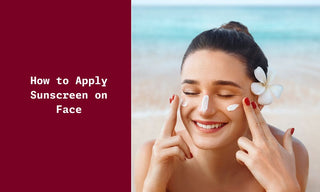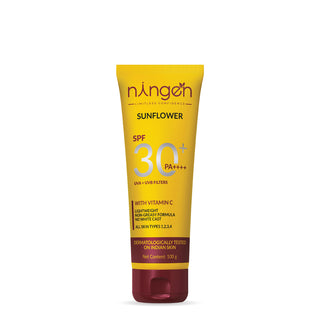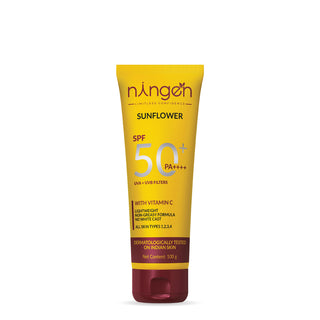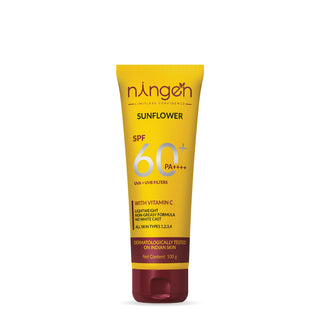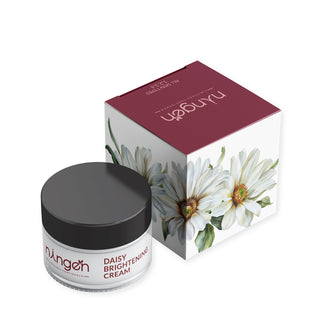Shielding your skin from the sun's harmful rays is crucial for maintaining a healthy complexion and preventing premature aging. One of the most effective ways to protect your face from sun damage is by applying sunscreen. However, proper application is key to ensuring maximum protection. But are you doing it correctly? Are you aware of the common mistakes people make when applying sunscreen?
In this blog, we will provide you with essential tips and techniques on how to apply sunscreen on face. In this blog, we'll delve into the ins and outs of how to apply sunscreen on your face effectively. From choosing the right sunscreen to mastering the application technique, we'll cover everything you need to know to keep your skin safe and radiant under the sun.
In This Article;
- Why Do You Need Sunscreen?
- Step Sy Step Guidance on How to Apply Sunscreen On Your Face
- Understanding Different Types of Sunscreens
- Choosing the Right Sunscreen for Your Skin Type
- The Importance of Broad-Spectrum Sunscreen
- The Bottom Line
- TL;DR(Too Long; Didn't Read)
- Frequently Asked Questions
Why Do You Need Sunscreen?
- Sunscreen is not just for summer; it's crucial for daily skincare.
- It protects your skin from harmful ultraviolet (UV) rays from the sun.
- UV rays can cause immediate damage like sunburn.
- Long-term effects of UV exposure include premature aging, hyperpigmentation, and increased skin cancer risk.
- UV radiation consists of UVA and UVB rays:
- UVA rays penetrate deeply, causing premature aging and wrinkles (photoaging).
- UVB rays are primarily responsible for sunburn.
- Both UVA and UVB rays can damage the DNA in skin cells, potentially leading to skin cancer, including melanoma, the most dangerous form.
- Regular use of sunscreen creates a protective barrier that absorbs or reflects UV radiation.
- Sunscreen helps maintain an even skin tone by preventing sun-induced discoloration and dark spots.
- It preserves overall skin health and appearance.
- Sunscreen is essential for all ages and skin types.
- Daily use of sunscreen ensures healthy, youthful skin protected from sun exposure's adverse effects.
- Applying sunscreen should be a consistent step in your skincare routine, regardless of the weather.
Note: Read our other article to know more about why is sunscreen essential for your skin.
Step Sy Step Guidance on How to Apply Sunscreen On Your Face
-
Choose the right sunscreen
Ideally, it should also serve as a moisturizer and must be suitable for your skin type, age, moisture level, individual conditions, and sensitivities. It should also serve as a moisturizer. Look for a sunscreen that has an SPF of at least 30 and offers broad-spectrum protection against both UVA and UVB rays. If you have sensitive skin, you may want to choose a sunscreen that is labeled as "hypoallergenic" or "non-comedogenic" to avoid irritation or breakouts. -
Clean Your Face
Use a gentle cleanser to remove dirt, oil, and makeup and gently pat your face dry with a clean towel. -
Apply sunscreen before moisturizer
When applying sunscreen to your face, it's best to do so before applying moisturizer. This is because moisturizers can dilute the sunscreen and make it less effective. Apply the sunscreen first, allowing it to fully absorb into your skin before applying your moisturizer. Use Ningen Daisy Moisturising Cream.
-
Use the right amount Using the right amount of sunscreen is crucial for effective protection against the sun's harmful UV rays and ensuring the health of your skin.
One commonly recommended method for determining the proper amount of sunscreen is the "two-finger rule."
The two-finger rule involves using enough sunscreen to cover the entire surface of your skin adequately. Here's how it works: - Two-Finger Method: Squeeze out enough sunscreen to cover the length of two fingers (index and middle fingers) placed side by side. This amount is roughly equivalent to one teaspoon, which is the recommended amount for covering the face and neck.
-
Apply evenly
When applying sunscreen to your face, it's important to apply it evenly to ensure that you're getting complete coverage. Start by applying the sunscreen to the center of your face, then work your way outward, making sure to cover your forehead, nose, cheeks, chin, and neck. Be sure to blend the sunscreen well to avoid leaving any streaks or patches. -
Don't forget your ears and lips
When applying sunscreen to your face, it's important not to forget your ears and lips. These areas are often overlooked but are just as susceptible to sun damage as the rest of your face. Apply sunscreen to your ears and lips to ensure that you're getting complete protection. -
Reapply throughout the day
Sunscreen should be reapplied every two hours to ensure that you're getting adequate protection. This is especially important if you're spending a lot of time outdoors or engaging in activities that cause you to sweat or get wet. Be sure to carry a travel-sized bottle of sunscreen with you so that you can reapply as needed throughout the day. If you are in direct sunlight the sunscreen should be reapplied after every 2 hours and it should be applied more often if it is not waterproof or you have extremely sun-sensitive skin. It should be applied after every time you have been swimming or extremely perspiring. Sunscreen worn to the office on a typical day without excessive direct sun exposure does not need to be reapplied.

Understanding Different Types of Sunscreens
When stepping out into the sun, it's important to understand the different types of sunscreens available to ensure you're using the right kind for maximum protection. Sunscreens can be broadly classified into chemical, physical, and spray sunscreens, each with their unique properties and benefits. Knowing which sunscreen is suitable for your skin type and lifestyle will help you safeguard your skin effectively.
Chemical Sunscreens
Chemical sunscreens work by absorbing UV rays. These sunscreens contain organic (carbon-based) compounds, such as oxybenzone, octinoxate, octisalate, and avobenzone, which create a chemical reaction and change UV rays into heat, then release that heat from the skin. They are often preferred for daily use because they're lighter in texture and can provide a sheer appearance without leaving a white cast—making them a popular choice for those who wear makeup over sunscreen.
When applying chemical sunscreen, it's a rule of thumb to wait approximately 15-30 minutes before sun exposure to allow it to fully absorb into the skin. This time frame allows the chemicals to activate and form a protective layer. Also, these sunscreens should be reapplied every two hours or immediately after swimming or sweating to ensure continuing protection.
Physical Sunscreens
In contrast, physical sunscreens, sometimes referred to as mineral sunscreens, contain active mineral ingredients like titanium dioxide or zinc oxide. They work by sitting on top of the skin and deflecting and scattering damaging UV rays away from the skin. Unlike chemical options, physical sunscreens often leave a white cast, especially noticeable on deeper skin tones, but newer formulations are designed to minimize this effect.
Physical sunscreens are known to be suitable for individuals with sensitive skin, as they are less likely to cause skin irritation. Moreover, they provide protection from the sun as soon as they are applied, without the need to wait. For those who have dry skin, many physical sunscreens come with hydrating ingredients to moisturize while providing sun protection. Because they are not absorbed into the skin but instead form a layer on top, reapplication is still necessary after exposure to water or extended periods of sweating.
Spray Sunscreens
Spray sunscreens provide a convenient and quick application process, making them ideal for those on-the-go or for applying to hard-to-reach areas. As the name suggests, these sunscreens come in a spray form and can be found in both chemical and physical formulations. Spray sunscreens should be applied generously and evenly to ensure full coverage, and it's often recommended to spray it into your hands first and then apply to the face to avoid inhalation.
While spray sunscreens are water-resistant and a favorite for outdoor activities, they also require a liberal application. Because it's harder to gauge how much is applied, the protection factor may vary if not used correctly. Be mindful not to inhale the spray and keep away from open flames, as many spray sunscreens contain flammable ingredients.
Powder sunscreens
Powder sunscreens are a form of sun protection that come in a powdered format, often similar in appearance to loose face powder or compact powder makeup. They contain active ingredients such as zinc oxide or titanium dioxide, which provide broad-spectrum protection against UVA and UVB rays. These sunscreens are designed to be applied with a brush, making them convenient for reapplication throughout the day, especially over makeup.
Powder sunscreens offer several benefits:
- Ease of Use: They are easy to apply and can be conveniently carried in a purse or bag.
- No Greasy Residue: Unlike some lotions or creams, powder sunscreens do not leave a greasy residue, making them ideal for people with oily or acne-prone skin.
- Makeup-Friendly: They can be applied over makeup without disrupting it, allowing for seamless sun protection touch-ups.
- Matte Finish: They often provide a matte finish, which can help control shine on the face.
Remember, regardless of the type of sunscreen you choose, it should be broad-spectrum, offering protection against both UVA and UVB rays, have a Sun Protection Factor (SPF) of at least 30, and be a part of your daily skincare routine for effective sun protection.
Choosing the Right Sunscreen for Your Skin Type
When selecting a sunscreen, considering your specific skin type is crucial for not only maximum sun protection but also avoiding discomfort and ensuring a pleasant skincare routine. Whether your skin is dry, oily, or sensitive, there's a sunscreen out there perfect for your needs.
Dry Skin
Individuals with dry skin should opt for sunscreens that have a creamy texture and are formulated with moisturizing ingredients. These ingredients can include hyaluronic acid, glycerin, oils, and other emollients that help keep skin hydrated. Physical sunscreens are often a good match for dry skin since many contain hydrating components. Look out for labels such as "moisturizing," "for dry skin," or "hydrating" to make an informed choice. A broad-spectrum sunscreen with an SPF of 30 or higher that caters to dry skin can prevent sun damage while providing necessary moisture.
Oily Skin
Oily skin types may find sunscreens with a matte finish and oil-free formulations to be the most comfortable. Chemical sunscreens typically have a lighter feel and are less likely to leave a greasy residue. Water-resistant options are also recommended as they are less likely to slide off or degrade with the presence of excess oil and sweat. Seek out labels with phrases like "oil-free," "non-comedogenic," which means it won't clog pores, and "matte finish" to help manage shine throughout the day.
Sensitive Skin
Sensitive skin requires a gentle approach, and physical (mineral) sunscreens containing titanium dioxide or zinc oxide are often the best choice. These ingredients are less likely to cause irritation because they are not absorbed into the skin but rather sit on top of it. Opt for sunscreens that are fragrance-free, hypoallergenic, and designed for sensitive skin. Sunscreen lotions and sticks are preferable over sprays to avoid inhalation, which might irritate sensitive respiratory passages. Pay attention to terms like "for sensitive skin," "fragrance-free", and "hypoallergenic" on product labels to make a careful selection.
Note: Click here to know your skin type.
The Importance of Broad-Spectrum Sunscreen
Protecting your skin from the sun's harmful rays is essential to prevent skin cancer, premature aging, and other forms of sun damage. Broad-spectrum sunscreen is your frontline defense, offering protection against both UVA and UVB rays. UVA rays can prematurely age your skin, causing wrinkles and age spots, while UVB rays can burn your skin.
A broad-spectrum sunscreen can help to shield your skin from these effects. When selecting sunscreen, look for one that offers a Sun Protection Factor (SPF) of at least 30 for maximum protection. For extended periods outside, remember to choose water-resistant options and reapply as instructed.
By integrating broad-spectrum sunscreen into your daily skincare routine, you reduce the likelihood of sunburn and safeguard against harmful long-term effects. Pairing sunscreen with protective clothing, hats, sunglasses, and lip balms with SPF can enhance your defense against sun exposure.
Quick Tips:
- Choose Broad-Spectrum for UVA & UVB protection.
- Opt for SPF 30 or higher.
- Water-resistant is best for swimming or sweating.
- Apply liberally and evenly to all exposed areas.
- Reapply every two hours, or immediately after swimming or excessive sweating.
- Complement with protective clothing and SPF lip balm.
By adhering to these guidelines, you'll not only help prevent skin cancer but also maintain youthful, healthier skin.
Note: What Is SPF?
Sun Protection Factor (SPF) measures how well a sunscreen protects your skin from UVB rays, which cause sunburn and contribute to skin cancer. An SPF rating indicates the theoretical time you can stay in the sun without getting burned. For example, SPF 30 theoretically prevents reddening 30 times longer than without sunscreen. However, protection is not linear—SPF 30 filters out about 97% of UVB radiation, while SPF 50 filters out about 98%. No sunscreen blocks 100% of UV rays, and high-SPF products offer only slightly more protection.
Nurture and Shield your skin Naturally with Ningen
If you're seeking a gentle and effective sun care cream that harnesses the power of phyto-cosmeceuticals, consider trying Ningen Sunflower Sun Care Cream. This dermatologically tested cream combines the benefits of natural ingredients like Sunflower, Geranium, Wheat Germ, and Liquorice. By incorporating phyto-cosmeceutical principles, this cream aims to provide both cosmetic and therapeutic advantages for your skin. With its gentle formulation and absence of heavy scents, you can enjoy the nourishing properties of these plant-based ingredients while incorporating a touch of nature into your daily beauty routine.
But that's not all! This cream will protect your skin from the sun's harmful UV radiation while giving it a deep dose of nourishment to bring back its natural radiance. It'll also keep your skin hydrated and brightened. And if you're worried about harsh chemicals, don't be! Ningen Sunflower is free of parabens and phthalates, making it safe for all skin types.
So go ahead and enjoy the sun, knowing your skin is well taken care of!
Explore our handpicked selection of the best skincare products featuring Sunscreen below.
The Bottom Line
Hope this article guided you well about how to apply sunscreen on face. Proper sunscreen application is essential for protecting your skin from the harmful effects of UV rays, including sunburn, premature aging, hyperpigmentation, and skin cancer. By understanding the different types of sunscreens—chemical, physical, and spray—you can choose the right one for your skin type and lifestyle. Remember to apply sunscreen before moisturizer, use the correct amount, apply it evenly, and reapply throughout the day, especially when exposed to water or sweat. Broad-spectrum sunscreens with an SPF of at least 30 offer the best protection, ensuring your skin stays healthy, youthful, and radiant. Integrate these steps into your daily skincare routine to shield your skin effectively from sun damage.
"Your future self will thank you for applying sunscreen."
Quick View
Properly applying sunscreen is crucial to protect your skin from harmful UV rays. Choose the right sunscreen for your skin type, apply it before moisturizer, use the right amount, and reapply every two hours or after swimming/sweating. Broad-spectrum sunscreens with SPF 30 or higher offer the best protection against sunburn, premature aging, and skin cancer. Make sunscreen a daily habit for healthy, radiant skin.
Frequently Asked Questions
Q1. How much sunscreen should I apply to my face?
A: You should apply about a nickel-sized amount of sunscreen to your face. This ensures adequate coverage to protect your skin from UV rays.
Q2. When should I apply sunscreen in my skincare routine?
A: Apply sunscreen as the final step in your morning skincare routine, after moisturizer and before makeup.
Q3. How often should I reapply sunscreen on my face?
A: Sunscreen should be reapplied every two hours, or more frequently if you are swimming, sweating, or wiping your face.
Q4. Can I use moisturizer with SPF instead of sunscreen?
A: While moisturizers with SPF provide some protection, it's generally recommended to use a dedicated sunscreen to ensure you get broad-spectrum protection and adequate coverage.
Q5. Do I need to wear sunscreen indoors?
A: Yes, it's important to wear sunscreen indoors because UVA rays can penetrate windows and still cause skin damage.
Q6. How long should I wait after applying sunscreen before going outside?
A: Wait about 15-30 minutes after applying chemical sunscreen to allow it to fully absorb into the skin. Physical sunscreens provide protection immediately upon application.
Q7. Can I apply sunscreen over makeup?
A: Yes, you can use a spray or powder sunscreen to reapply over makeup. These products are designed to provide protection without disturbing your makeup.
Q8. What type of sunscreen is best for acne-prone skin?
A: Look for non-comedogenic, oil-free, and fragrance-free sunscreens. Mineral sunscreens with zinc oxide or titanium dioxide are often recommended for acne-prone skin.
Q9. Should I apply sunscreen to my neck and ears?
A: Absolutely. Your neck and ears are also exposed to the sun and should be protected with sunscreen to prevent sun damage.
Q10. Can I use the same sunscreen for my body and face?
A: Yes, you can use the same sunscreen, but facial sunscreens are often formulated to be lighter and less likely to clog pores. If you have sensitive skin, a facial sunscreen may be a better option.


